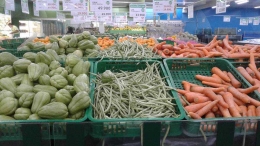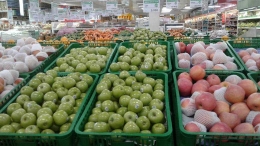Indonesia is an agrarian country and the eight largest producer of fruits and vegetables. However, most Indonesian still do not consume enough of these two food groups in their daily diet. A common view is that One should eat to only feel full and delicious. So, most people do not even care if they consume starch based junk food, high in calories with little to null nutritional value. This of course undermines fruit and vegetables purpose and promote into their daily menus.
In fact according to the 2013 data from the Department of Agriculture, on average each Indonesian consumes only 34.55 kg fruits and 40.35 kg vegetables annually. Meanwhile Food and Agriculture Organization (FAO) has recommended that each individual consumes 73 kg of fruits and 91.25 kg of vegetables every year.
Diseases Related to Lack of Nutrition
Based on WHO/FAO standard, the minimum recommended intake of fruits and vegetables is 400 grams per capita per day. Yet, most of the population are not meeting this requirement. For this reason we need to pay more attention to what we eat and whether it is sufficient to maintain our health.
Low fruits and vegetables intake is a main contributor to micro nutrient deficiencies in many developing world. Inadequate intake is also recognized as one of the key risk factors for cardiovascular diseases and some form of cancers.
Growing economy has also changed people’s life style. Global tight competition has made people busier. As a result it is increasing their likelihood to consume unhealthy food with unbalanced nutrition. They frequent have fast-food consumption at most of the fast food restaurant chains with lack of fruits and vegetables intake. As we all know that fast food generally has a high-energy density, which together with large portion sizes, induces over consumption of calories.
A number of observational studies have assessed the association between frequent fast-food intake and weight gain. The American population study by Cardia suggests that frequent fast-food consumption is positively associated with weight gain and risk of insulin resistance that caused of developing type 2 diabetes and coronary artery disease.
As a result obesity is often appearing on the rise in the society. This eventually has caused an increasing trend of non-communicable diseases, such as heart disorder, kidney failure, liver malfunction, high cholesterols, diabetes, etc.
This is happening in Indonesia too. There are two types of malnutrition; malnutrition that is caused by poverty, while the other is caused by consuming high calories that tend to obese. Currently Indonesia is facing both types of malnutrition as Jansen Ongko, Msc, RD, a nutrition consultant and fitness educator, mentioned during his interview with myself.

Another type of malnutrition that happens in Indonesia is malnutrition. A main factor is poverty. That is for the people who are less fortunate, so they are unable to afford the fruit and vegetables in their daily diet. As a result they eat only to feel full with high calories and little nutritional value that can contribute to stunting.














